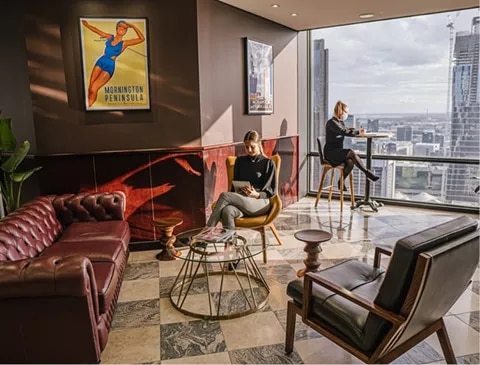The Largest Business Costs In The UK Right Now in 2023
By Varun Bodhi

From inflation to an energy crisis, the UK is experiencing some trying times and businesses are significantly impacted from the flow on effects of these events. Starting a business is an exciting experience but in the current climate it’s essential to understand the biggest business costs and how startup costs can be effectively managed for a smoother journey.
Making the right decisions and investments can save thousands of dollars, so here’s how you can financially prepare to tackle the largest business costs in the UK right now.
Choosing an Office Space
Every business needs a hub of operations.
Even if your business embarks down the track of enabling hybrid work conditions, it’s important to have an office space for several reasons. Whether it is credibility, increasing collective innovation, to give business identity or other reasons – an office space is essential.

However, acquiring a traditional office space is arguably the largest business cost in the list and will make up majority of a start up’s costs. According to a recent commercial real estate price index by Statista, London West End Bond Street is the most expensive location and costs an average of £2000 per square foot.
For locations in Oxford Street, London City, Manchester and Birmingham the costs are £650, £240, £220 and £180 respectively. With the required minimum space per employee being 53 square feet, your business can expect to pay anywhere from £9540 to £106,000 per annum.
Furthermore, an office in such locations usually comes with a long lease term. This means your business must be ready to commit to the space for several years and be financially stable enough to continue this.
Having a business cost so large is only feasible for companies which are already financially excelling, or one’s which take a loan. Of course, signing up for a loan is an additional business cost because of repayments and interest rates which will dictate the total cost. This is where businesses will need to be mindful of selecting the right type of loan and determining whether a fixed or variable interest rate is better suited to accommodate for business costs.
This makes acquiring an office space at the top of the list for startup costs, however there are many office space alternatives which can provide the same functionalities at a lower cost.
An example of this are serviced offices at Servcorp, which are in the prime locations of the UK whilst being much more affordable. These can be rented on very flexible terms and come fully furnished, along with many other amenities such as secure Wi-Fi, shared kitchen, access to meeting rooms, call routing technology and much more.
These serviced offices can be found in prestigious locations such as One Mayfair Place, Leadenhall Street, Old Broad Street and Canary Wharf.
Equipment
Sourcing equipment is another factor that makes the list of large business costs in the UK. Although capital expenditure on equipment is dependent on your business model, the average spend is anywhere from £8312 to £103,906 for a small business.
The challenge with equipment is that it often becomes superseded. Concomitant to technological advancements are equipment upgrades and this can be very costly. Equipment also has its own life expectancy, therefore making it an asset which eventually becomes a liability.
This is where businesses need to evaluate if they should lease or purchase equipment. Leasing equipment is helpful for businesses with limited capital, as it preserves finances and provides flexibility – but it can cost more in the long term.
Leasing equipment enables you to easily upgrade when needed but comes with the downsides of not owning it and needing to pay the entire lease term regardless of discounting its use.
On the other hand, buying equipment gives immediate ownership and you can claim tax depreciation deductions. If equipment is only needed temporarily, it will be wiser to lease it and the opposite is true for equipment that is needed permanently.
Office supplies can fall under the same category as equipment, but adroit measures such as making everything digital can be a great method to save on business costs.
Salaries and Employees

Business costs are classified under two forms, variable and fixed.
Generally speaking, salaries are a fixed business expense and while it contributes to productivity output, it takes time to have a return on investment. A startup’s costs are already vast and owners need to consider a lot of factors as they are in their most volatile stage of their business life cycle – hence salaries can be a barrier to expanding.
The average salary in the UK for a full-time role is around £38,131, which means a small team of five will cost up to £190,655. Combine this with the finance needed to acquire office space and equipment – your business is looking at a big price tag.
Salaries aren’t the only cost associated with employees. The entire hiring process of creating a job advertisement, interviews, selections and rejections, take a lot of time.
Time is money that your business could be making and not to mention the resources which go towards training employees is also a business cost. Your team is only human, so there is bound to be sick leave, annual leave, parental leave and the inevitable leaving of team members involved – all part of business costs.
Luckily, there are solutions to help businesses and especially to reduce startup costs. Referring back to Servcorp’s serviced offices, businesses are also provided with a support team to delegate to. This includes your own dedicated receptionist to answer business related calls, in-house I.T support and secretarial assistance.
Average Salary:
- Receptionist - £24,500
- Secretary - £29,500
- I.T technician - £29,000
By having this team as part of your serviced office, a total of £83,000 is saved in business costs.
Marketing
One of the most important parts of any business which allows it to put its name out there and make sure potential customers know about its services or products is marketing. In the UK, startup costs related to marketing can vary depending on the type of business, but they are usually some of the biggest expenses associated with starting a company.
Marketing is considered to be an investment because its results aren’t shown immediately, but overtime changes can be noticed. Generally speaking, marketing budget is a percentage of the business’ revenue, with B2B companies spending between 2%-5% and B2C companies spending between 5%-10%.
Since that is a marginal business cost, it’s essential that you invest in the best strategies to ensure success. The most common strategies to employ are pleasant website design, search engine optimisation, content marketing, social media marketing, pay-per-click campaigns and email marketing.
Some of these strategies require upfront investments while others offer more cost-effective options allow for scaling up or down at any time. Of course, there are traditional forms of advertising such as television and radios ads, however these would be a large business cost and it’s best to explore other avenues first.
Creating a successful marketing campaign takes time and money, hence tracking outcomes will be important to ensure resources are allocated effectively – this provides invaluable feedback and helps reduce potential business costs.
Energy
The UK is currently facing an energy crisis and it is currently proving to be a major business cost. An increase in demand and limited supplies due to the conflict in Ukraine has caused for high energy prices and with no surprise its effecting business costs.

On average, small businesses pay between £2,900 to £3,900 per year for their combined gas and electricity bill. For larger businesses, this number reach approximately £12,000 per year, however with the current geopolitical issues the cost is slowly climbing.
There are government initiatives to help assist businesses and individuals with energy bills, however owners should do more for their own good. To stay on track with revenue goals, businesses will need to estimate the amount of electricity, gas and oil they will need on a monthly basis.
Trying to find methods to source energy cost effectively will pay off generously in the current climate. This can be accomplished through varies methods such as green tariffs, renewable sources such as wind or solar power, and even switching between providers – every dollar counts.
Businesses which install solar panels on-site can also generate their own electricity or uses excess head generated from other processes to power radiators of hot water systems. Business owners may be eligible for grants of subsidies when investing in renewable energy sources which could help reduce upfront business costs.
Other than estimating how much energy you expect to use, it’s also wise to consistently track energy usage and costs over time to identify potential areas of improvement. There is plenty of technology available such as smart meters which are connected directly to the grid to monitor usage versus budget and compare against similar companies in your sector.
This information is great for benchmarking purposes and will assist in creating efficiency. It’s also important to not forget the basics and review contracts periodically with supplies and check meter readings frequently – this will help ensure bills are accurate and you are not being overcharged.
To optimise long-term savings and mitigate business costs, it may be wise to consider small investments such as energy-efficient equipment or appliances. Using LED lighting and Energy Star rated products, whilst introducing simple initiatives such as switching off lights when leaving a room or turning down thermostats during colder months can have a big impact on overall costs without compromising on comfort levels.
As opposed to using a traditional office, businesses can consider utilising flexible workspaces such as coworking to reduce energy costs. Servcorp’s Coworking spaces are fully furnished and include several amenities such as secure Wi-Fi, receptionist, secretarial support and in-house I.T support. All costs are inclusive in the membership, hence making it a cost-effective solution during expensive times.
Administration
Administration tasks involve a range of activities that are essential to the successful running of any business, yet it often gets overlooked when considering business costs.
According to research, small businesses spend between 230 and 240 days per year on administrative tasks, equating to 17% of total staff effort spent on administration. While this isn’t a direct ‘expense’, businesses are losing an excessive amount of time on performing duties which don’t create revenue. As a monetary figure, research indicates that the global service industry loses more than $5 trillion annually.
The bottom line is that administrative tasks are a major business cost and particularly startup cost. As opposed to creating revenue, business owners or their staff are performing tasks which can’t be ignored yet have no direct impact on growing the business.
Ideally, these tasks should be delegated for time efficiency and for the greater productivity of the business. Startup costs can be reduced by incorporating virtual services as part of their business model.
Virtual receptionist and secretarial services are staffed by experienced professionals who can manage everything from answering business calls under your company’s name, customer service inquiries, bookkeeping, filing and document preparation. The most important part is, these services are available at the fraction of the cost it would traditionally be.
For example, a Servcorp virtual receptionist can assist businesses from £95 per month. With the average salary of a receptionist in the UK being £24,500, businesses save up to £23,310.
Website Design
In the digital age, creating a powerful website is extremely important.

E-commerce has made everything fast paced and the number of options consumers have is endless. To keep up with this, creating a clean website which succinctly delivers your brand’s key information is essential, however this comes at a significant cost.
Creating a website can range anywhere from £169 to £11,313 and this isn’t inclusive of any ongoing costs. Research suggests that ongoing costs of website maintenance can slowly pile up from content production, imagery, hosting and domain.
There are alternative applications which allow businesses to create their own website, however this is only recommended for those who have experience in developing a user friendly site.
Loans
Borrowing money from banks and institutions contributes a significant amount towards startup costs, or any business for that matter. As a rule of thumb, businesses total capital should not comprise more than 30% of credit debt.
If we use the United States as an example, according to Statista the average debt held by small and medium businesses is $100,000 to $250,000. At the same time, up to 26% of businesses have no debt at all, but this indicates that majority of firms have many business costs and require loans to operate, survive or expand. By observing other global examples, it can be seen that many small businesses end up having their debt overdue because business costs end up being too large and cash flow is tight.
Unfortunately loans also comprise a large number of business costs in the UK, with around 82% of SME’s owing an outstanding balance. According to the British Business Bank, a good debt ratio is 1 to 1.5 and this can be calculated by dividing your totally liabilities by the total amount of shareholders’ equity. It can also be calculated by deducting total liabilities from total assets.
What can Business do?
Businesses need to factor in the above costs and plan their budget accordingly to reduce business costs. Owners should also consider investing in professional services such as auditors or lawyers if necessary, as well as automated tools for efficient processes. Businesses costs can be reduced by taking advantage of virtual receptionist and secretarial services for administrative tasks, and invest in website design with SEO so their website can be found by potential customers. By taking these steps, business costs can be managed from the get-go and chances of success can be increased over time.
Contact Us
If you’ve got any questions call us +44 203 059 7800 or fill in your information below and we’ll get back to you shortly.





